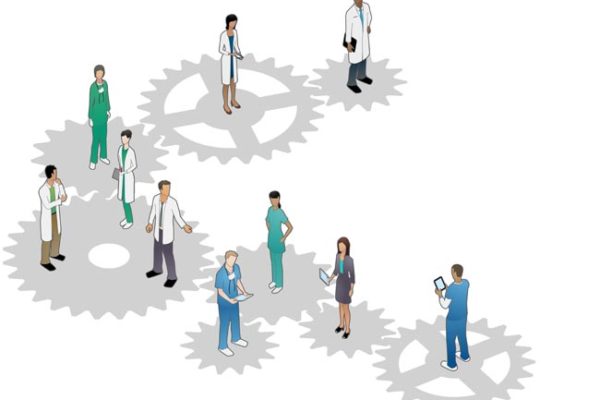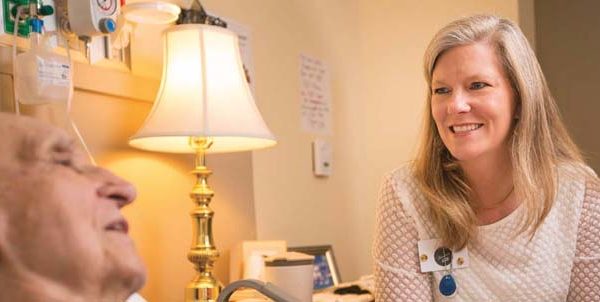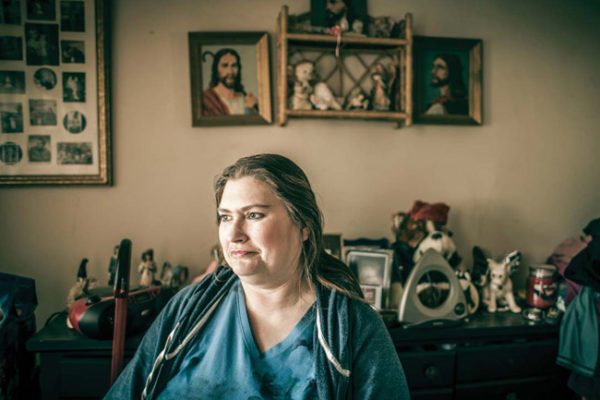Providers in demand

Centerstone’s LaTisha Pike, MSN’13, left, a psychiatric-mental health nurse practitioner, serves as preceptor for PMHNP student Christine Matthews. Matthews, who graduated from Peabody College in 2016, receives the School of Nursing Alumni Scholarship in recognition of her deep commitment to volunteerism. Photo by Joe Howell.
Matthew Hardy, PhD, regional vice president of Centerstone, one of the nation’s largest behavioral health care organizations, recently hired six psychiatric-mental health nurse practitioners (PMHNP) to serve the rapidly expanding need for mental health and addiction services in the northern area of Middle Tennessee that he oversees.
He said he could have hired six more the very next day. The demand is that critical.
“There’s more demand, and the number of providers hasn’t kept up with the demand,” Hardy said. “Some of the reason is population growth. Many cities are growing rapidly. But we’re also finding that we, as a culture or society, are more open to discussion (about mental health). There’s been a reduction of the stigma of mental illness and it’s easier for people to go and get help.”
According to the National Alliance on Mental Illness, about one in four people experience symptoms of a mental illness in a given year, and one in 17 struggle with serious mental illness. About 70-90 percent of individuals with mental illness saw improvement in their symptoms and quality of life after participating in some form of treatment.
The not-for-profit Centerstone has had a partnership with Vanderbilt University School of Nursing for more than a decade, providing an opportunity for students in the program to gain clinical experience. The graduates of VUSN’s PMHNP program are so uniquely qualified that Hardy’s hired several graduates and would like to hire more, he said.
“We value our partnership with the School of Nursing,” Hardy said. “It’s mutually beneficial. Our ongoing relationship has always been a win/win. We get to know the students very well, and it’s a great learning experience for both of us.”
Holistic and collaborative
VUSN’s PMHNP program integrates the biological, psychological, social and spiritual elements of mental health care in a holistic manner, preparing its graduates to work collaboratively with all members of the mental health team and coordinate care with primary care providers.

PMHNP student Will Siegal is one of five students currently based at Centerstone. He and his preceptor, Brittany Haemmerlien, MSN’09, BA’06, see patients ranging in age from 5 to 50-plus. Photo by Joe Howell.
Evidence has shown that mental disorders are strongly related to the occurrence of many chronic diseases including diabetes, cancer, cardiovascular disease, asthma and obesity and many risk behaviors for chronic disease, such as physical inactivity, smoking, excessive drinking and insufficient sleep, according to the Centers for Disease Control and Prevention.
A PMHNP can treat patients of all ages — from ‘womb to tomb’ — in a variety of practice settings, including community mental health care centers, correctional facilities, integrated care settings, residential treatment facilities, and inpatient psychiatric facilities, along with many other settings including private practice, said Dawn Vanderhoef, PhD, MSN’00, DNP, director of VUSN’s PMHNP program.
VUSN students graduate prepared
to expertly assess a patient’s mental health symptoms, diagnose and treat common acute and chronic psychiatric conditions. Often treatment includes prescribing medications and individual and group psychotherapy. PMHNPs also coordinate and integrate multidisciplinary services for patients with complex mental health issues and physical health care problems, referring for specialized medical treatment as needed.
The PMHNP program at VUSN is offered full-time over three semesters, or part-time over two years. Fourteen full-time faculty are devoted to the program, which combines classroom learning, simulated experiences and clinical training. All PMHNP faculty actively practice and engage in weekly supervision with students, providing a unique experience for the students to hear from psychiatric-mental health experts.
The program’s modified distance learning format allows students to stay and work in their communities, coming together at VUSN three times in the fall and spring, and twice in the summer for intensive sessions. About half of the 60 students currently enrolled live outside Middle Tennessee.
For more than five years, students graduating from the program have had a 100 percent pass rate on their board certification. VUSN graduates, Vanderhoef said, leave the program as practice-ready clinicians who are well educated with clinical experience providing care in the full scope of the PMHNP role.
Partnership in Practice
Placing students in the best clinical experiences is key to the program’s success and one of the reasons that it is ranked second in the nation by U.S. News & World Report, Vanderhoef said. Students in the program must complete a minimum of 620 clinical hours to graduate, but most far exceed that, she said.
“Our students are exposed to thought leaders through their academic and clinical work, ready to meet the workforce shortage demands. We have a strong partnership with multiple organizations that care for not just people with mental illnesses, but for the whole person,” she said.
The partnerships have been selected because of the variety of mental health care provided and that the organizations are imbedded in the community, treating people near where they live, Vanderhoef said.
Many offer a full range of mental health services, including substance abuse treatment, intellectual and developmental disability services, housing, educational services and community support for people of all ages who suffer from myriad behavioral health challenges.
Centerstone, for example, has 21 outpatient clinics throughout Middle Tennessee, with five in Nashville and Davidson County. Its patients include those on state-supported plans and those with fixed incomes.
The organization’s more than 35 full-time nurse practitioners evaluate and diagnose patients, and provide therapy and medication management supervised by a psychiatrist. The majority of the nurse practitioners are VUSN graduates, Hardy said.
“As part of a team, they manage a group of patients assigned to a team of providers. They are co-leaders of the team, along with a case manager. These very cohesive teams meet several times a week and treat our consumers over time,” he said. Vanderbilt PMHNP students are incorporated into the teams and work with Centerstone providers as their preceptors.
“As the student gets more comfortable, and the preceptor is more comfortable working with the student, the student begins to do more and more, eventually doing the entire initial assessment with a provider in the room. It’s a real collaborative effort,” Hardy said.
Complex but not impossible
Another site that both employs VUSN graduates and provides PMHNP clinical rotations is The Next Door, a nonprofit organization that helps women in crisis, those who are impacted by addiction, mental illness, trauma and/or incarceration, and their families.
Two nurse practitioners (both of whom graduated from VUSN) join physicians, counselors and case managers to provide comprehensive care to patients of The Next Door.
The Next Door helped about 1,000 women and their families in 2017. In addition to addiction, most often with opioids, many have co-occurring mental illnesses and physical issues such as diabetes, said Cindy Sneed, NCC, LPC-MHSP, and chief clinical officer of The Next Door.
“It takes a true team approach to treat our patients,” she said. “Their needs are complex, but not impossible, to handle, and they affect their daughters, mothers, sisters, grandmothers. Their addiction can cause devastation and hurt to the entire family. The patients want help, they want to stop using, but their bodies don’t agree.

Jennifer Wilson, MSN’07, is one of two VUSN alumni working at The Next Door. She also serves as a preceptor to Vanderbilt students. Photo by John Russell.
“This (the opioid epidemic) is not going to go away, and it’s important that new practitioners get education to understand how opioids affect a person. They need real world experience where the rubber meets the road.”
VUSN graduate and Julia Hereford Society scholar Hannah Nolte, BA’15, MSN’17, did a clinical rotation at The Next Door as a student, and said the hands-on experience was invaluable in preparing her for her current job at an outpatient hospital practice.
Nolte, who worked as an EMT in Connecticut before pursing her undergraduate degree in psychology at Vanderbilt, said she had already been exposed to many different types of patients in emergency situations by the time she enrolled at VUSN. She was drawn to patients with mental health needs.
“Mental health supports and mediates how we’re able to function and relate to other people and how healthy we really are,” she said. “I realized I wanted to focus on that with a nursing degree and with the patients I was going to work with.”
What she didn’t fully understand before her clinical experience was the extent of mental illness in a community and the havoc that it wreaks upon both the patient and their family.
“There are so many challenges that go along with mental illness that extend to all parts of a person’s life — their physical health as well as all of their social relationships, how they feel about themselves, what they can accomplish and how independent they’re able to be,” Nolte said.
“There’s still a lot of stigma with mental illness and when someone is seeking care and recovery and improvement, they’re recognizing in themselves something that society has said you need to get over on your own,” she said.
“Seeing someone who lacks hope and who is having a difficult time and then to see them improve over the course of one month, six months, a year … it’s really powerful to see that change in someone and to be able to point it out.”
Mental illness compounded by poverty
VUSN students also gain clinical experience with the Mental Health Cooperative (MHC) in Nashville, an organization that combines community-based behavioral health services, primary health care and pharmacy resources for adult, children and adolescent patients in need. With satellite offices in Cookeville and Chattanooga, Tennessee, MHC reaches 42 counties in Middle Tennessee and Chattanooga through nine offices.
MHC also provides mental health services to Nashville’s homeless population and has 24-hour emergency psychiatric services. Five to seven VUSN students receive clinical experience each year through the organization.
“The patients they interact with are children and adults who have serious mental illness and who are also struggling with the effects of living in poverty. The students come to understand the barriers this population faces every day,” said Pamela Womack, chief executive officer of MHC.
“The partnership (with VUSN) has proven invaluable,” Womack said. “MHC is able to hire new graduates from the student population who have had their clinical experience with us. We know them through their student rotation and they already know what it’s like to work at MHC with our patient population. For VUSN, their students have a valuable learning experience and good prospects of having a job with MHC when they graduate.”
by Nancy Humphrey







